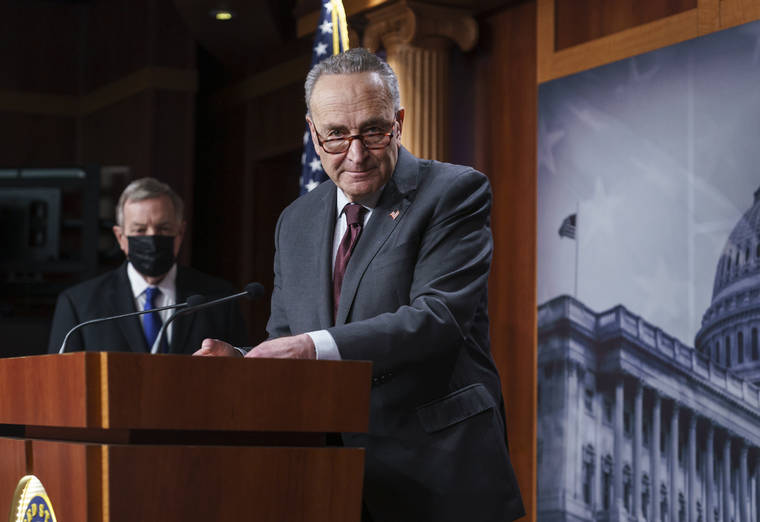WASHINGTON — Senate Majority Leader Chuck Schumer announced an agreement Wednesday with Republicans to organize the evenly split chamber, ending a weekslong standoff that prevented the new Democratic majority from setting up some operations and soured relations at the start of the congressional session.
The Senate later approved the agreement by unanimous consent.
Schumer, D-N.Y., said the deal with Senate Republican leader Mitch McConnell of Kentucky settled committee ratios and other details in the 50-50 chamber, where Democrats have the slim edge because Vice President Kamala Harris is a tie-breaking vote.
Senators can now promptly “get to work, with Democrats holding the gavels,” Schumer said.
Organizing the Senate is typically a routine procedure at the start of a new Congress. But the prolonged negotiations involved a power play by McConnell as Republicans refused to relinquish control without first trying to extract concessions from Democrats that Schumer refused to give.
In particular, McConnell wanted Schumer to commit that Democrats would not end the legislative filibuster. Getting rid of that procedural tool would make it easier for the new majority to approve President Joe Biden’s agenda on a 51-vote threshold, rather than the 60 votes typically needed to advance bills.
Schumer refused to yield, but two centrist Democrats, Sens. Joe Manchin of West Virginia and Kyrsten Sinema of Arizona, had earlier announced they would prefer to keep the filibuster intact. That essentially denied Schumer the votes needed to change the rules, and McConnell dropped his demands.
McConnell said the agreement “will allow the Senate to be fairly run.” He noted it was similar to one reached in 2001, the last time the Senate was equally divided.
Under the terms, the Senate leaders agreed to try allow a more robust amendment process that could give senators a chance to shape legislation and also limit the number of time-consuming procedural blockades against bills.
In particular, Schumer stated he would “commit to increase dramatically the number of member-initiated amendments offered.” He also said he was opposed to limiting amendments unless “dilatory measures prevent the Senate from taking action and leave no alternative.”
In his own statement, McConnell said the commitment for amendments “should help in alleviating” the use of certain procedural motions.
The agreement means Democrats can take control of the committees and set up other operations that have stalled during the standoff. The committees will largely have equal budgets, office space and other resources.
Democrats hope to hold a confirmation hearing Monday for Merrick Garland, Biden’s nominee for attorney general, before the start of former President Donald Trump’s impeachment trial.
Republicans lost the majority after two Georgia Democrats won run-off elections on Jan. 5, ousting incumbent Republican senators, and Harris became vice president on Jan. 20.
———
This story has been corrected to reflect that Sen. Sinema’s first name is spelled Kyrsten.


